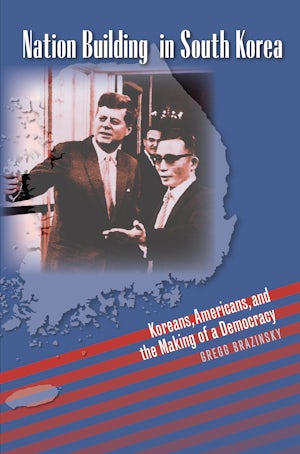Nation Building in South Korea
Koreans, Americans, and the Making of a Democracy
By Gregg A. Brazinsky
328 pp., 6.125 x 9.25, 6 illus., notes, bibl., index
-
Paperback ISBN: 978-0-8078-6181-3
Published: September 2009 -
E-book EPUB ISBN: 978-0-8078-6779-2
Published: November 2009 -
E-book PDF ISBN: 979-8-8908-7980-6
Published: November 2009
New Cold War History
Buy this Book
- Paperback $37.50
- E-Book $25.99
For Professors:
Free E-Exam Copies
Expanding the framework of traditional diplomatic history, Brazinsky examines not only state-to-state relations, but also the social and cultural interactions between Americans and South Koreans. He shows how Koreans adapted, resisted, and transformed American influence and promoted socioeconomic change that suited their own aspirations. Ultimately, Brazinsky argues, Koreans' capacity to tailor American institutions and ideas to their own purposes was the most important factor in the making of a democratic South Korea.
About the Author
Gregg Brazinsky is assistant professor of history at the Elliott School of International Affairs at the George Washington University.
For more information about Gregg A. Brazinsky, visit
the
Author
Page.
Reviews
"A major contribution to the study of a crucial period of South Korean development. . . . A particularly important and timely book, as it not only details the close US-South Korean co-operation and the extent of US assistance in this period, but it also underscores the difficulties that external assistance faces in the process of nation-building."--International History Review
"Brazinsky, more than anyone else, has provided systematic, in-depth empirical evidence drawn from both the U.S. and South Korea to illustrate the subtle and changing dynamics of the U.S.-South Korean patron-client relationship. . . . Brazinsky's work will surely be read profitably by all those interested in modern economic development, democratization, and nation-building. Students of U.S. foreign relations will also profit from this in-depth case study of U.S. foreign policy, whereby U.S. intervention has actually led to what is, overall, a successful nation-building exercise."--American Historical Review
"Offers a complex and compelling narrative of the multilateral social, cultural and political connections between Americans and South Koreans during South Korea's formative years."--Pacific Affairs
"Brazinsky's fluency in the Korean language and tremendous research efforts allow him to present the voices of the people of the South and the formative role they played in their own evolution in more depth and sophistication that those who have written before him. . . . International history at its very best."--Journal of American History
"Even as successive U.S. political administrations prioritized security in [their] high-level dealings with South Korea, other U.S. agencies and organizations helped to build a more diverse and protodemocratic society from below. . . . Illuminates this complex dynamic in U.S.-South Korean relations."--Korean Quarterly
"A refreshing, insightful look at nation building via South Korea. . . . Highly recommended."--Choice




